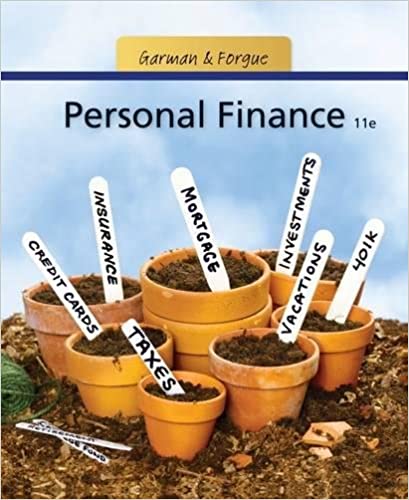Description
Test Bank For Personal Finance 11th Edition by E. Thomas Garman
Chapter 2—Career Planning
TRUE/FALSE
1.Effective career planning will help you identify an employment pathway that aligns your interests and abilities with the tasks expected.
ANS: T PTS: 1 DIF: easy REF: p. 36
2.The time and effort you put into your career planning effort will affect how much income you earn and how far you advance in your career.
ANS: T PTS: 1 DIF: easy REF: p. 36
3.A career goal can be a specific job or field of work.
ANS: T PTS: 1 DIF: easy REF: p. 37
4.A career plan provides guidance to help you attain your career goals.
ANS: T PTS: 1 DIF: easy REF: p. 36
5.Interest inventories are the qualities that allow you to perform job-related tasks.
ANS: F
interest inventories help people assess the activities that give them satisfaction.
PTS: 1 DIF: easy REF: p. 37
6.According to the U.S. Census Bureau, adults with an advanced degree earn approximately $48,000 more per year than adults with only a high school diploma.
ANS: T PTS: 1 DIF: moderate REF: p. 37
7.According to the U.S. Census Bureau, adults with an advanced degree earn approximately $48,000 more per year than adults with only a bachelor’s degree.
ANS: F
those with advance degrees earn $26,000 more.
PTS: 1 DIF: moderate REF: p. 44
8.According to the U.S. Census Bureau, getting an advanced degree has a bigger impact on annual income (as compared to a bachelor’s degree) than getting a bachelor’s degree (as compared to graduating from high school).
ANS: T PTS: 1 DIF: moderate REF: p. 44
9.According to the U.S. Census Bureau, adults with a bachelor’s degree earn approximately $22,000 more per year than adults with only a high school diploma.
ANS: T PTS: 1 DIF: moderate REF: p. 44
10.An internship may allow you to develop new skills as well as a chance to network.
ANS: T PTS: 1 DIF: easy REF: p. 39
11.Weighing the demands of particular jobs with your social and cultural preferences involves making lifestyle trade-offs.
ANS: T PTS: 1 DIF: easy REF: p. 38
12.Dual-career couples normally have an easier time resolving quality-of-life issues.
ANS: F
quality of life issues are more complex when there are two workers.
PTS: 1 DIF: easy REF: p. 39
13.Professional networking is the process of establishing and using contacts to obtain and exchange career information.
ANS: T PTS: 1 DIF: easy REF: p. 40
14.High-demand occupations tend to pay low salaries.
ANS: F
high demand occupations pay higher salaries.
PTS: 1 DIF: easy REF: p. 42
15.Most of the contacts you make through networking will be in a position to offer you a job.
ANS: F
most contacts will not be in a position to offer a job but still provide valuable leads.
PTS: 1 DIF: moderate REF: p. 40
16.As many as 75 percent of all job openings are listed in want ads.
ANS: F
fewer and fewer job openings are posted in want ads.
PTS: 1 DIF: moderate REF: p. 40
17.Approximately 7 percent of workers work at home online.
ANS: T PTS: 1 DIF: moderate REF: p. 43
18.When comparing salary offers from employers in different cities, you should gather information regarding the approximate cost of living in each city.
ANS: T PTS: 1 DIF: easy REF: p. 56
19.Comparing salary offers from employers located in different cities can be difficult without sufficient information on the approximate cost of living in each community.
ANS: T PTS: 1 DIF: moderate REF: p. 56
20.Nonsalary benefits are forms of compensation that result in the employee not having to pay out-of-pocket money for certain expenses.
ANS: T PTS: 1 DIF: easy REF: p. 44
21.Job seekers should focus primarily on salary as employee benefits are not a major contributor to overall compensation.
ANS: F
nonsalary benefits can be 25 percent or more above a worker’s salary.
PTS: 1 DIF: moderate REF: p. 44
22.Salaried employees are paid overtime, and the majority of college graduates have salaried positions.
ANS: F
salaried employee generally are not paid overtime.
PTS: 1 DIF: easy REF: p. 46
23.When you leave an employer, you have the right to continue your health insurance coverage for a specified period of time by paying the premiums yourself.
ANS: T PTS: 1 DIF: easy REF: p. 47
24.Nearly 20 percent of workers cash out all of the money they have accrued in their employer-sponsored retirement plan when changing jobs.
ANS: F
nearly half of workers make this financially costly decision.
PTS: 1 DIF: moderate REF: p. 45
25.A résumé is a summary record of your education, training, experience, and other qualifications.
ANS: T PTS: 1 DIF: easy REF: p. 47
26.A secondary function of a résumé is to provide a basis for screening applicants out of contention for a job.
ANS: F
this is the primary function of requiring a résumé.
PTS: 1 DIF: moderate REF: p. 47
27.A résumé in a chronological format would position the first of your previous three jobs at the beginning of the document.
ANS: F
in this format jobs are listed placing the most recent first
PTS: 1 DIF: moderate REF: p. 48
28.A résumé in a chronological format would position the first of your previous three jobs at the end of the experience section of the document.
ANS: T PTS: 1 DIF: moderate REF: p. 48
29.A common mistake in résumés is to list specific accomplishments instead of listing the functions and responsibilities that you had in your previous jobs.
ANS: F
this is the preferred approach.
PTS: 1 DIF: moderate REF: p. 48
30.Posting your résumé on Monster.com is all you need to do to get a good job.
ANS: F
you should never rely on just one approach when seeking a job.
PTS: 1 DIF: moderate REF: p. 48-49
31.Employers can obtain your credit report and may use the information contained in the report to make an employment decision.
ANS: T PTS: 1 DIF: moderate REF: p. 47
32.Most employment agencies earn their fees from the individual searching for a job.
ANS: F
fees are most commonly paid by the employer.
PTS: 1 DIF: easy REF: p. 51
33.The main purpose of a cover letter is to indicate a desired a salary.
ANS: F
the cover letter provides an introduction to the employer and salary preferences should not be discussed.
PTS: 1 DIF: easy REF: p. 52
34.A cover letter should be designed for each specific position for which you are applying.
ANS: T PTS: 1 DIF: easy REF: p. 52
35.The same cover letter with the appropriate address and salutation can be used when seeking interviews from multiple employers.
ANS: F
cover letters should be tailored to the specific position being sought.
PTS: 1 DIF: moderate REF: p. 52
36.After mailing off a cover letter, you should wait at least a month before you contact the employer.
ANS: F
two-weeks is ample time for following up on a cover letter
PTS: 1 DIF: easy REF: p. 53
37.Whenever you request that someone write a reference letter you should provide the person with your resume.
ANS: T PTS: 1 DIF: easy REF: p. 53
38.You should avoid using specific abilities such as using MicroSoft Office in your résumé.
ANS: F
such terms are often looked for in scanning software and will help you stand out from the crowd.
PTS: 1 DIF: moderate REF: p. 47
39.Prior to a job interview, you should research the company, the company’s competitors, and the industry.
ANS: T PTS: 1 DIF: moderate REF: p. 54
40.Misrepresenting a few small facts or exaggerating a bit during an interview is expected and should not have a negative impact during a job interview.
ANS: F
any such statements will call into question the other information in your résumé and statements made during the interview.
PTS: 1 DIF: easy REF: p. 55
41.After a job interview, you should immediately e-mail a thank-you note and restate your interest in the position.
ANS: F
e-mailed thank you notes should only be used if you are very sure this is the preferred method of contact.
PTS: 1 DIF: moderate REF: p. 56
42.You should discuss salary during the job interview, but you should not offer a definitive dollar amount.
ANS: F
wait until a job offer has been tendered to discuss salary.
PTS: 1 DIF: moderate REF: p. 56
43.In most cases, you should not turn down a job offer without taking a day or two to think it over.
ANS: T PTS: 1 DIF: easy REF: p. 57
44.Failure to obtain a job offer after an interview is most likely due to some failing during the interview.
ANS: F
failure to obtain an offer is simply due to a mismatch between the applicant’s qualities and the needs of the employer.
PTS: 1 DIF: easy REF: p. 56
45.You should use key terms such as honesty and teamwork in your résumé.
ANS: T PTS: 1 DIF: easy REF: p. 50





Be the first to review “Test Bank For Personal Finance 11th Edition by E. Thomas Garman”